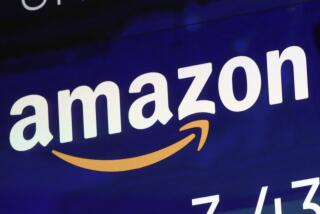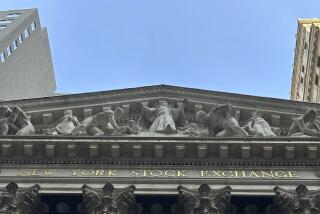Amazon gets first dance with $1,000 share price
The technology sector’s remarkable run on Wall Street this year produced a new milestone Tuesday as Amazon.com shares sold for $1,000 for the first time.
The Internet superstore has seen its share price double in less than two years, a period in which the Seattle company’s rapid growth around the world has upended the shopping, entertainment and data storage industries.
Hovering around the rarefied $1,000-mark will do little to change Amazon’s day-to-day business, but it could boost the company’s cachet and free it from some stock-market volatility.
“For a lot of consumers and investors, the checkered flag has been waved,” said Ryan Jacob, whose firm Jacob Asset Management specializes in tech investments. “Amazon is the dominant player in retail today, and it’s hard to imagine anyone having the resources to catch up.”
Just four U.S.-listed companies trade for more than three figures, though Google parent company Alphabet Inc. is nearing its first taste of $1,000 too. On Tuesday, Amazon traded as high as $1,001.20 before closing at $996.70, up 92 cents; Alphabet closed at $996.17, up $2.90.
At such high prices, shares of Amazon and Google are drawing additional scrutiny. There are concerns that prices will soon flatten and that too much growth concentrated on too few companies could squeeze out upstarts.
The tech giants’ shares also may be unaffordable for mom-and-pop traders picking up individual stocks. As the Internet sector boomed in the 1990s, many companies (including Amazon) split their stock to lower the price of a single share while still allowing shareholders to maintain the same percentage of ownership.
Finance experts say stock splits have fallen out of favor in the latest tech-stock frenzy. Individual investors are flocking to funds that hold a basket of stocks, such as exchange traded funds that mirror an index, rather than making bets on individual companies.
Mutual funds and other big money managers care little about price after deeming a company fairly valued. And high prices give the impression that people are getting something premium. Amazon founder and Chief Executive Jeff Bezos reportedly told shareholders this month that a split isn’t in the works.
Those who do get priced out may not be the type of long-term investors Amazon wants anyway. Higher-priced stocks often change hands less frequently than comparable lower-priced ones. That helps companies weather market fluctuation.
“If an institution is going to buy $5 million worth of Amazon … they certainly don’t care if they buy 5,000 shares of a $1,000 stock or 50,000 shares of a $100 stock,” said Michael Pachter, managing director for equity research at Wedbush Securities.
Amazon’s rise on Nasdaq, and that of the technology sector in general, would seem to reflect that sentiment. Though nearly every sector except energy has ridden a post-election wave in recent months, the tech sector has topped the charts.
Shares of Facebook, Amazon, Netflix and Google (via Alphabet) — a collection of powerful consumer Internet companies referred to as FANG — have increased about 30% this year. By comparison, the Standard & Poor’s 500 market index has grown about 9%.
The amount of investment going into tech-sector funds is growing at the fastest annualized rate in 15 years, according to Bank of America Merrill Lynch research released this month.
The firm noted Tuesday that survey results show big investment funds managed by expert stock-pickers continue to hold about a third more tech shares than is historically common.
Investors have been attracted to Facebook and Alphabet because they’re grabbing advertising deals away from old-media operators such as newspapers and TV stations. Netflix has rallied on the back of international subscriber growth. Even Apple has bounced back with strong sales after fears last year that the iPhone, lacking major innovations, was losing appeal.
But when it comes to growth and potential, analysts see Amazon in a unique and enviable position.
“Amazon remains our favorite idea for new money,” BMO Capital Markets analyst Daniel Salmon wrote to investors last month, estimating that shares could reach $1,200 in a year.
It wasn’t always that way. Amazon shares sat below $100 for most of the 2000s. Investors waited for the day that the online bookstore would turn a profit or realize gains from its spending on ventures such as perfecting logistics and licensing music and movies.
Shares surged over the last eight years as investors began to appreciate Bezos’ vision. Smartphones made on-the-go shopping and browsing easier, increasing demand not only for Amazon’s core consumer service but also for the advertising, warehousing and technology services it sells to businesses.
Amazon’s $724 million in quarterly profit is meager compared to its $35.7 billion in sales. But investors are buying up dividend-less shares because they see a company expanding unlike any other. It has already crushed or destroyed dozens of big retailers, including Borders, Macy’s and Radio Shack, and it has achieved just 10% market share domestically.
“We now have 19 straight quarters of 20% retail revenue growth for Amazon — which means [its] retail growth has never been more consistent,” RBC Capital Markets analyst Mark Mahaney said last month.
It’s not just the retail business that’s booming. About 10% of the company’s sales now come from companies leasing online storage and computing technology. The Web services business is growing at a 40% clip with fat profit margins in a combination “that is practically impossible to match in public markets,” Mahaney said.
A $100 investment on Amazon’s first day of trading in May 1997 would be worth more than $50,000 today. At $1,000 per share, Amazon’s market capitalization is about $478 billion, which ranks fourth in the U.S. behind Apple, Alphabet and Microsoft.
It’s also double the market capitalization of the world’s biggest traditional retailer, Wal-Mart, and more than 15 times the size of Target. Bezo holds about 17% of outstanding Amazon shares, making his stake worth about $80 billion.
Other companies trading above $1,000 include online travel booking company Priceline Group Inc., home builder NVR Inc., pork producer and ocean transportation company Seaboard Corp. and Warren Buffett’s Berkshire Hathaway Inc.
By virtue of having more shares on the market, Amazon.com is well over four times the size of Priceline, NVR and Seaboard combined. It’s 17% bigger than Berkshire Hathaway, a multinational conglomerate with ownership stakes in some of America’s most well-known consumer brands like Coca-Cola, insurance companies and U.S. infrastructure.
Had Apple not done a 7-for-1 share split three years ago, it probably would have beaten Amazon to the $1,000 mark.
The run-up in tech companies, whose innovative business models attract investors eager to gamble on unproven ideas, has led to concerns about an investment bubble that’s close to popping. But fund managers say the cash being generated by the likes of Amazon and Facebook justifies the high prices. Instead, their fear is that too much of the interest is focused on the few large companies.
“Investors have been able to have a cake and eat it too because they’ve been able to invest in the least riskiest, most well-established companies, and they’ve produced the best returns,” said Jacob of Jacob Asset Management.
But over time, smaller companies perform better, he said, predicting that as attention shifts to the rest of the sector, big Internet companies finally will see their share prices “take a breather.”
Twitter: @peard33
The Associated Press contributed to this report.
UPDATES:
4:35 p.m: This article was updated to include additional details about Amazon’s financial performance.
This article was originally published at 3:50 p.m.







